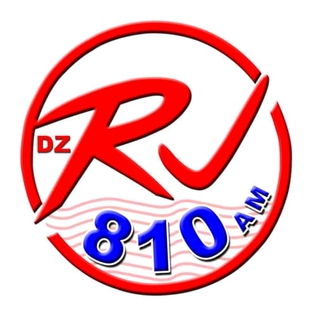DZRJ-AM
 |
|
| City | Makati City/Quezon City |
|---|---|
| Broadcast area |
Metro Manila, surrounding areas Worldwide (Online) |
| Branding | DZRJ 810 AM |
| Slogan | Ang Himpilan ng Bawat Pilipino Iba Ito! (8TriMedia) |
| Frequency | 810 kHz |
| First air date | 1963 (as Boss Radio) February 24, 1986 (as Radyo Bandido) August 25, 2010 (as The Voice of the Philippines) October 4, 2015 (8TriMedia on DZRJ) |
| Format | News, Public Affairs/Talk, Entertainment, Music, Religious, Blocktimers |
| Power | 50,000 watts |
| ERP | 91,800 watts |
| Callsign meaning | Ramon Jacinto |
| Former frequencies | 780 kHz (1963-1979) |
| Affiliations | BBC World Service, Voice of America, The Philippine Star, 8TriMedia Broadcasting Network |
| Owner | Rajah Broadcasting Network, Inc. |
| Sister stations |
RJ 100.3 FM RJTV 29 (2nd Avenue) |
| Webcast |
Listen Live (via eRadioPortal) Listen Live (via Ustream) 8TriMedia Live Streaming |
| Website | DZRJ 810 RJplanet.com |
DZRJ-AM (810 AM) is an AM radio station based in Metro Manila, Philippines, owned by the Rajah Broadcasting Network, Inc., currently under blocktime agreement with 8TriMedia with selected original programming. Its present studio location is at Unit 404 Seneca Plaza Building, E. Rodriguez Sr. Avenue, New Manila, Quezon City and Ventures Building-1, General Luna Street, Poblacion, Makati City. while its radio transmitter is located along Quirino Highway, Novaliches, Quezon City.
DZRJ-AM was originally found in the broadcast frequency of 780 kilohertz on the AM band. It carried the tagline, "DzRJ: Boss Radio", which later evolved into "DzRJ, The Rock of Manila" as it hosted a daily show called "Pinoy Rock 'n' Rhythm" (later shortened to "Pinoy Rock"), which was conceived by DzRJ's original station manager, Alan Austria ("Double-A") and its program director, Emil Quinto ("Charlie Brown"). DzRJ's radio personalities, the "Bossmen", then the "RockJocks", became celebrities in Manila's counterculture.
The daily Pinoy Rock 'n' Rhythm radio show, which was hosted by Bob Lopez-Pozas ("Bob Magoo") and, later, by Dante David ("Howlin' Dave"), featured the early vinyl releases of pioneering Filipino rock groups such as RJ and the Riots', the Juan Dela Cruz Band and Anakbayan, as well as submissions (on cassette tapes) of recordings from Manila's unsigned bands and independent artists. The earliest contributions were from groups such as Maria Cafra ("Kamusta Mga Kaibigan"), Petrified Anthem ("Drinking Wine"), Destiny ("A Taste Of Honey"), and a fledgling Apolinario Mabini Hiking Society.
A mobile recording studio was set up by Alan Austria in 1974, using the station's 4-track tape recorder and mixing board, for "live-in-the-booth" recordings to facilitate the entries of contestants for one of its sponsors, RC Cola and its First National Battle of the Bands (produced by RC Cola's then COO, Cesare Syjuco). More than 200 new songs were said to have been recorded for the Pinoy Rock 'n' Rhythm show, and these entries were aired in succession through many weeks, as the participating bands worked their way into the elimination rounds. These demos paved the way for recording artists such as Florante, Heber Bartolome of Banyuhay, Johnny Alegre of Hourglass, Bob Aves of Destiny, and many others, who thrived in the Philippine record industry in later years.
...
Wikipedia
